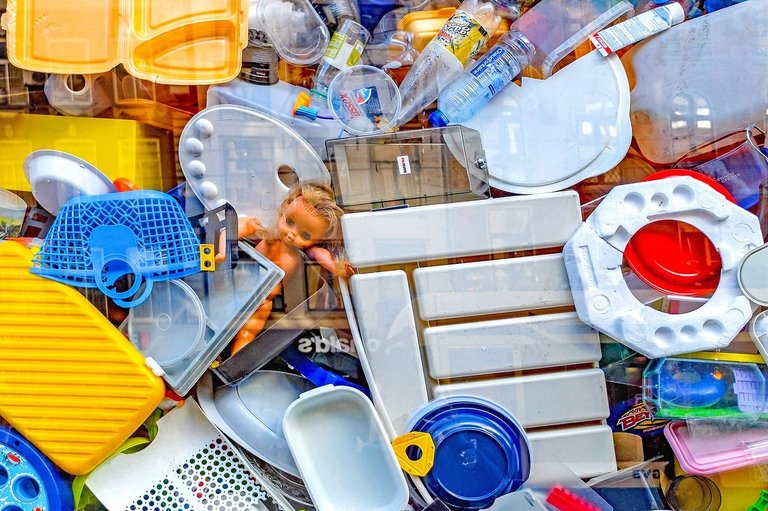Hello Everyone,
Today's prompt made me realize how far we have come in many things, trust me when I say there are now improvements in waste disposal and recycling.
Some years ago the Government brought a lot of initiative, and it was being worked on, one of it is the recycling policy, planting a tree per building and also operation key the environment clean.
The Government are trying their best but it's not enough, many a time people just tend to be very stubborn and unsupportive.
It's like a never-ending battle to keep our cities clean and our environment healthy. But I'm hopeful. I believe that with the right approach, we can turn this challenge into an opportunity.
Recently a lot of private companies too started investing deeply into Recycling business and lot more.
You are being paid for bringing empty Bottles, plastics even iron materials.
I'm constantly reminded of the waste management challenges that Nigeria faces. That's why I'm excited to share with you the state of recycling in Nigeria and the efforts underway to improve the situation.
The State of Recycling in Nigeria
Recycling in Nigeria is still in its infancy, not so much development unlike other wester countries. I remember visiting a local recycling center in Benue and being shocked by the lack of infrastructure and resources. The country's waste management infrastructure is inadequate, and recycling practices are not well-established. However, there are efforts underway to improve the situation.
In Nigeria, the informal recycling sector plays a significant role in waste management. Many individuals and small businesses collect and sort recyclable materials, which are then sold to recycling companies. While this sector provides employment opportunities, it also poses health risks to those involved. I've seen firsthand the impact of this sector on local communities, where people collect waste in makeshift facilities without proper protective gear.
Formal recycling initiatives:
Some organizations and companies have launched formal recycling initiatives in Nigeria. For example, the Nigerian Bottling Company has implemented a recycling program for plastic bottles, and the Lagos State government has established a recycling facility for electronic waste. These initiatives show promise, but more needs to be done to scale up recycling efforts.
Here in Benue state too, the infrastructure put in place is below par, therefore resulting into an ineffective recycling system.
Let's look at some of Challenges Facing Recycling in Nigeria
Despite the efforts to promote recycling, several challenges need to be addressed:
- Lack of infrastructure: Nigeria's waste management infrastructure is inadequate, making it difficult to collect and process recyclable materials. This is a major obstacle to effective recycling, as it hinders the ability to collect and process waste efficiently.
Limited public awareness: Many Nigerians are not aware of the importance of recycling or do not know how to recycle properly. This lack of awareness is a significant barrier to increasing recycling rates.
Inadequate regulations: There is a lack of effective regulations and enforcement to support recycling practices in Nigeria. This lack of regulatory framework makes it difficult to ensure that recycling practices are followed consistently. In my place here in Benue state, the number of recycling plants and workers are very few.
- Economic constraints: Recycling can be expensive, and many individuals and businesses in Nigeria may not have the resources to invest in recycling practices. This economic constraint is a significant challenge to increasing recycling rates. We need the Government to support all those companies willing to invest in it.
What is the solution to issue on ground?
I would just highlight some of the major solutions that would give us progress in effective recycling.
First of all we need to Increase awareness: There is a growing awareness of the importance of recycling in Nigeria, particularly among younger generations. This increased awareness is a positive development, as it suggests that more people are beginning to understand the importance of recycling.
Also Some entrepreneurs and organizations are developing innovative solutions to address waste management challenges in Nigeria, such as using waste-to-energy technologies. These innovative solutions offer a promising way to address waste management challenges. We also need more Government initiatives, the Nigerian government has launched initiatives to promote recycling, such as the "Clean Nigeria" campaign. These initiatives show promise, but more needs to be done to support recycling efforts.
Any Reliable Recycling Centres in My Neighborhood?
A big No, we don't have a recycling centre over her in Aliade (Gwer East LGA) Benue state, people have to move from Alaide to Makurdi or Gboko.
The truth is no one will ever want to go through that stress.
This is why I didn't often get my used items out for recycling instead we dumped it at the dustbin bin.
In Conclusion
Recycling in Nigeria is still in its early stages, but there are efforts underway to improve the situation. While there are challenges to be addressed, there are also opportunities for growth and innovation. By increasing public awareness, investing in infrastructure, and promoting effective regulations, Nigeria can develop a more effective recycling system and move towards a greener future.
This is my response to #hl-w160e2


